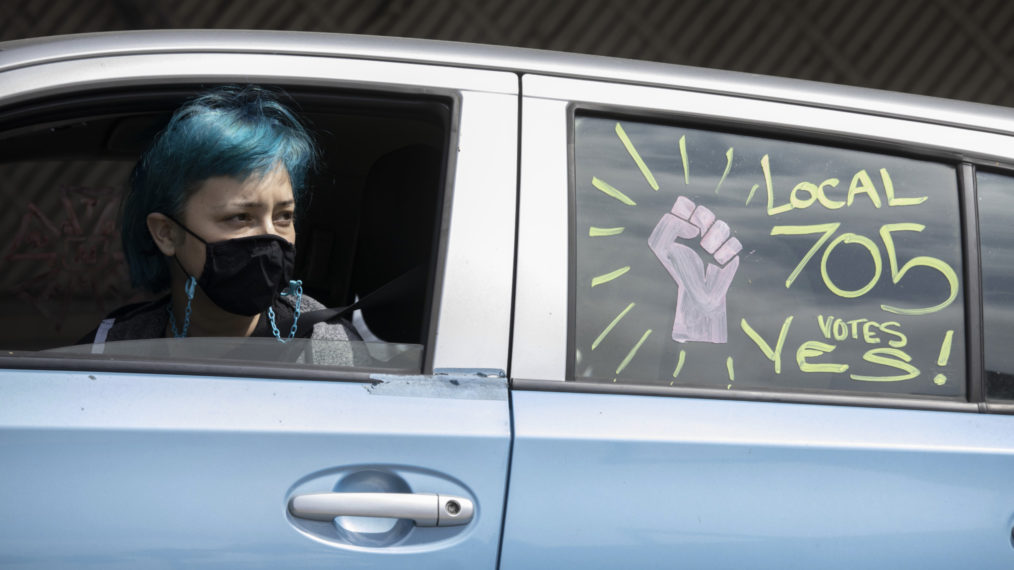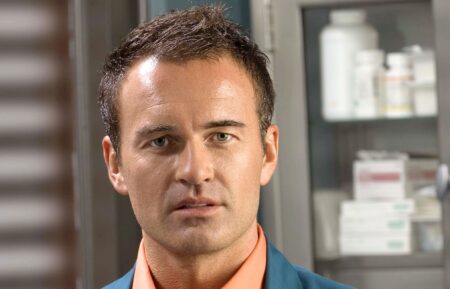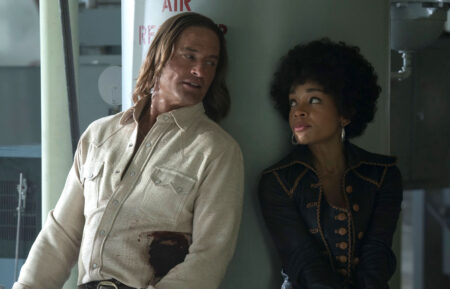How an IATSE Strike Would (and Wouldn’t) Affect Your Favorite TV Shows

If you remember the 2007–08 Writers Guild of America strike, you know that the 14-week work stoppage had a noticeable effect on the primetime lineup. Hit shows such as Desperate Housewives, CSI: Crime Scene Investigation, and Grey’s Anatomy aired shortened seasons as the broadcast networks scrambled to fill in their schedule gaps with reality series, game shows, and imports.
Now history may be repeating, as the IATSE labor union is voting on whether to authorize a strike, with results expected today, Monday, October 4. If that strike is authorized, and if IATSE can’t cut a deal with producers, Hollywood could face another devastating strike that would impact many (but not all) TV shows. Here are the details.
IATSE represents 150,000 workers across arts, media, and entertainment.
The International Alliance of Theatrical Stage Employees, Moving Picture Technicians, Artists and Allied Crafts of the United States, Its Territories and Canada—IATSE, for short—was founded in 1893, according to its website. It currently comprises 366 local unions across 13 geographic districts. In Hollywood alone, there are 15 local unions in movie and TV production, with Local 80 covering grips, Local 700 covering editors, Local 800 covering art directors, and Local 892 covering costume designers.
The organization wants to address “the most grievous problems” for crew members.
For months now, IATSE has been negotiating with the Alliance of Motion Picture and Television Producers (AMPTP) on successor contracts to the now-expired Producer-IATSE Basic Agreement.
And in a statement on September 21, IATSE claimed AMPTP has “failed” to work with them to address “the most grievous problems in their workplaces.” Those problems include unsafe working hours, unsustainable wages (especially on streaming projects), and unreasonably short breaks and rest periods, according to the organization.
“In short, it is incomprehensible that the AMPTP, an ensemble that includes media mega-corporations collectively worth trillions of dollars, claims it cannot provide behind-the-scenes crews with reasonable rest, safe hours, living wages, and sustainable benefits,” IATSE writes on its website.
IATSE Local 871 president Marisa Shipley, an art department coordinator who has worked on Grace and Frankie and Atypical, expressed a similar sentiment to Entertainment Weekly. “It certainly has not felt like the employers see us as humans, and recognize or acknowledge the real human toll that the current working conditions in the industry take,” she said. “I do hope that so many crew members speaking out makes a difference, and they hear us.”
The AMPTP, of course, has a different view of the negotiations: “The AMPTP put forth a deal-closing comprehensive proposal that meaningfully addresses the IATSE’s key bargaining issues.… In choosing to leave the bargaining table to seek a strike authorization vote, the IATSE leadership walked away from a generous comprehensive package.”
Crew members have been sharing their horror stories online.
I know you all are sick of me posting about this strike but I need all of you to understand the torture that is our industry standards. Please keep reading what I'm posting and educate yourselves. 🖤🖤 #IATSE #IATSESolidarity pic.twitter.com/mXgx2IvNoa
— Beebslaweez (@beebslaweez) September 28, 2021
The Instagram account IATSE Stories collects first-person accounts from crew members via anonymous DMs, and many are harrowing. “Our first [assistant camera] miscarried on our last set in the middle of the day. She was back the next day,” one person wrote. “I couldn’t stop looking in her direction the entire shoot. Her stone face, her quiet steady work ethic. I knew she was screaming inside. I hope you all scream for her. Strike.”
Another account: “I’m on a TV show and have been prepping all weekend and am very stressed.… My chest and stomach tightened up and sort of caved in so that I couldn’t breathe right. After a few minutes of this, I thought, ‘Maybe I’ll have a heart attack and go to the hospital, and then they’ll replace me.’ That comforted me.”
And a third: “While filming…a crew member collapsed on the driveway. It was a serious medical event, and an ambulance was called immediately. We didn’t stop filming, and they even asked the EMTs to work quietly so we could keep rolling.”
TV stars are speaking up for their IATSE coworkers.
Icons, forever and always. @JaneFonda and @LilyTomlin stand alongside @IATSE in #IASolidarity. #IAVoteYes pic.twitter.com/fjlG1g8lXg
— IATSE Local 600 (@ICGLocal600) September 21, 2021
Many celebrities have IATSE members’ backs. The Mindy Project creator and star Mindy Kaling, for one, tweeted her support on September 23, writing, “The crews are the backbones of our industry. First ones in, last ones out. They deserve safe conditions and attainable health care.”
In an Instagram post a day later, Katherine Heigl said that she will “always continue to support and stand by” her crew-member friends, referencing her fallout with Grey’s producers over the long workdays. “Some of you may remember over ten years ago I was very vocal about the absurdity of the working hours crews and actors were being forced into by production.… I very publicly and for many, many years after got my ass kicked for speaking up,” she wrote. “I speak up today and say with zero hesitation or regret. 14-, 16-, 17-, 18-hour workdays are not safe. They are not healthy. They cannot and should no longer be tolerated.”
The strike authorization vote is expected to pass, but the IATSE leadership says their goal is a deal, not a strike.
Per EW, the vote is expected to pass overwhelmingly, but even then a strike isn’t necessarily in the cards. If the vote passes, the IATSE leadership could call for a strike, but for now, they’re still hoping to work out their issues with the AMPTP at the negotiating table.
“Our goal is not to strike. Our goal is a fair deal,” IATSE president Matthew D. Loeb tweeted on Thursday, September 30. “@IATSE members deserve to have reasonable rest, sustainable benefits, living wages, and meal breaks.”
A strike would shut down most of Hollywood, but not all of Hollywood.
According to Business Insider, an IATSE strike would disrupt productions across North America, starting with talk shows and daytime soap operas, which have a tight turnaround, and then affecting scripted TV productions and film projects.
“[A strike] could affect the general public in that they may not have as much content to view in the future,” entertainment labor lawyer Alan Brunswick explained to the site. “It could slow down production of motion pictures and television shows, and that includes shows that will be on digital services like Amazon or Netflix.”
As Deadline reports, however, some premium cable networks have separate contracts with the IATSE that won’t expire until the end of 2022. “If you are working on commercials or for HBO, Showtime, Starz, Cinemax, BET or another company that has a contract still in effect—you must keep working,” IATSE told its members, according to the site. “You will not be a scab!”
Other agreements still in effect cover music video productions, low-budget theatrical productions, and AICP commercials, Deadline adds.







